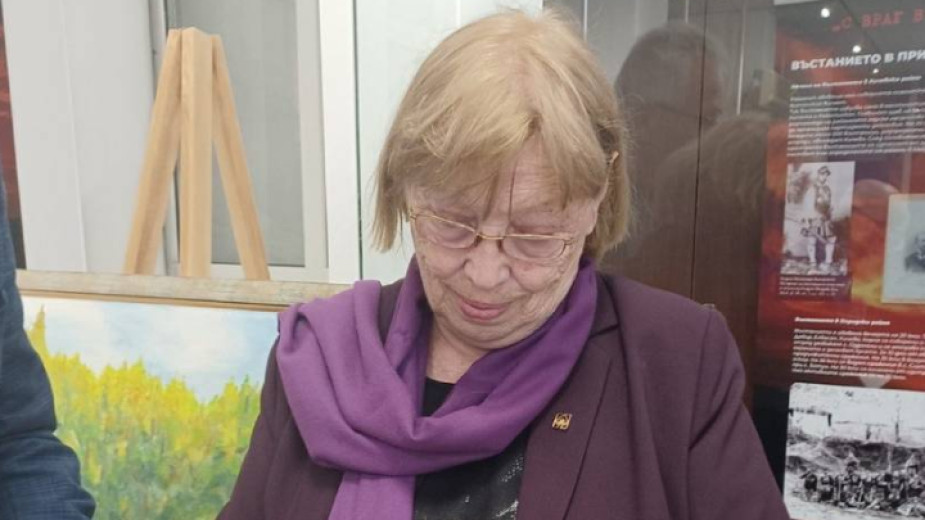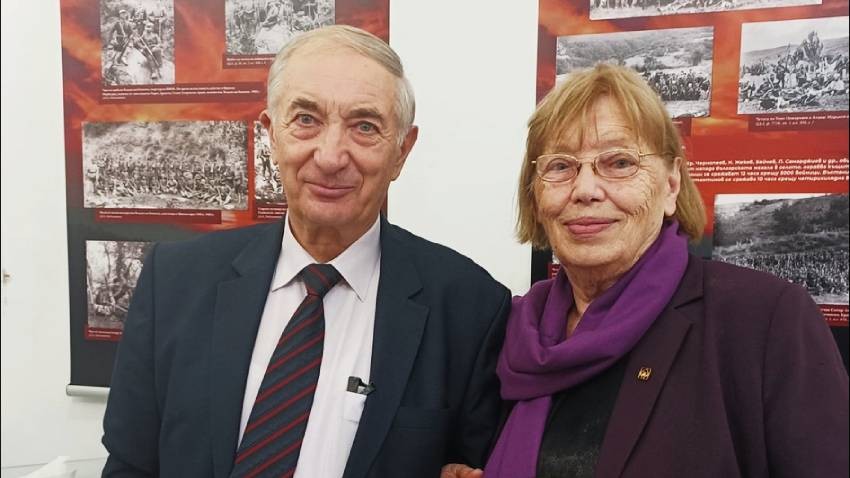 7
7
Writer Anna Maleshkova celebrated her 80th birthday at the end of 2023 - at a heartwarming meeting with like-minded friends at the State Archives in the capital. "I'm still looking forward, I still want to live, I love life, I love Bulgaria," says the Bessarabian Bulgarian, who left her native Moldova in 1971 for her ancestral homeland in the hope of a new beginning.
A chance meeting and the passionate love that followed sealed Anna Maleshkova's future. Born in the village of Valia Perzei, the then journalist met her future husband while he was touring Moldova with the Sliven Folklore Ensemble. Two years later, with a baby in their arms, the young family finally settled in Sliven, known as the the Town of the Hundred Voivodes.

"I was born during the war, I remember the hunger and shortages," Anna Maleshkova reminisced her childhood. In the post-war years we began to work early, but I am grateful to my grandparents and parents for teaching me to work from a young age."
The writer sums up her years in Bulgaria tersely, "Here I passed my apprenticeship, here I raised and taught my children, here I grew old."
She co-authored her works with her brother Nikolay Kurtev, and it is no coincidence that they are called "the keepers of the memory of the past and present of the Bulgarian community in Bessarabia". They have published the history of the village of Valya Perzhei, a historical calendar, a collection of Bessarabian-Bulgarian proverbs and sayings, and the biography of the most notable Bulgarian writer from Tavria, Misho Hadjiyski. Also noteworthy are the novels that tell of the period from the Bulgarian migration to Bessarabia over 200 years ago until today.

"And now we are still writing," says Anna Maleshkova. "In our latest book, Footprints in History, we are talking about the Bulgarians who have left their mark on the culture, the politics and the army in the Russian Empire, during the Soviet Union and in modern times. There are many interesting facts, and I will give you just one example: the great famine of 1946-1947. In Bessarabia, there are usually three good harvests in a row, and the fourth year is dry. While working on Chronicles of Bessarabia, we found a document in the Ukrainian town of Izmail in which a mother bequeathed her body to her two daughters so that they could feed themselves and survive. Can you imagine what that means? I myself remember famine, and I hope today nobody knows about it, although unfortunately it exists in some parts of the world. War and famine are the most terrible things that humanity has "achieved".

"Our Bulgarians don't have these blatant traits of envy, malice, the smearing of people's names - from the president to the neighbour," she answers. - They are more subdued here, perhaps because during the migration people experienced more hardship, spent more difficult years than in Bulgaria, and this has had an effect. The Bulgarians in Bessarabia are a little softer in character and seem to have more decency and fear of God.
Anna Maleshkova puts decency at the top of the list of human values. She adds that education comes first in the family and then in school, so teachers must teach by personal example, knowledge and... backbone.

The elderly lady divides her time between various hobbies: writing, painting, cooking, bee-keeping, and each one opens a new window to knowledge, awe and wonder.
Order, discipline, cleanliness, hygiene: Anna Maleshkova discovered these universal virtues in her friends, the bees, who have accompanied her family for generations.
Like the beloved bees, sister and brother have long shared their responsibilities, and every evening, between 10 p.m. and midnight, in what they call "literary reading", they exchange ideas, correct drafts and share what they have written during the day. She from Bulgaria, he from Moldova, using technology, separated by borders, 605 km apart.
Photos by Diana Tsankova and the Bulgarians Abroad Executive Agency
Translated and posted by Elizabeth Radkova
The joy you see in the eyes of the people you have helped cannot be described in words, it must be experienced!" This was shared by Veneta Terzieva and Valentin Grigorov on Bulgaria's National Awakeners' Day. The two have been helping other Bulgarians in..
On October 24, the Honorary Consulate of Bulgaria in Norway was opened with an official ceremony and a festive concert in the Norwegian city of Stavanger. The first honorary consul is pianist Kiril Kutin, who has established himself as an authoritative..
There are more than 80,000 Bulgarians living in Moldova, with a concentration in the southern part of the country. Most are settled in the town of Taraclia and its surrounding region. One of the key institutions established by the Bulgarian community is..

+359 2 9336 661
